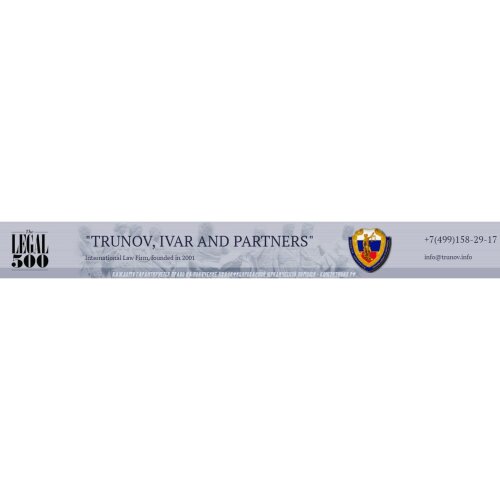Best Wage & Hour Lawyers in Russia
Share your needs with us, get contacted by law firms.
Free. Takes 2 min.
Or refine your search by selecting a city:
List of the best lawyers in Russia
About Wage & Hour Law in Russia
Wage & Hour law in Russia is governed by a combination of federal and regional regulations designed to protect the rights of workers regarding their pay and working hours. The cornerstone of these regulations is the Russian Labor Code, which outlines the minimum requirements for wages, working hours, overtime, rest periods, and other related matters. The law aims to ensure fair treatment of employees while providing businesses with guidelines for maintaining lawful employment practices.
Why You May Need a Lawyer
There are several situations where individuals may require legal assistance regarding Wage & Hour issues in Russia. Common scenarios include disputes over unpaid wages, disagreements over overtime pay, non-compliance with the minimum wage requirement, and unclear terms in employment contracts. Additionally, employees facing unjust termination or employer retaliation after raising concerns about wage discrepancies may seek legal help to protect their rights and obtain due compensation.
Local Laws Overview
The key aspects of Russian Wage & Hour laws include the following:
- Minimum Wage: The minimum wage is set by federal authorities and can vary by region, with regular adjustments based on inflation and economic conditions.
- Working Hours: Standard working hours should not exceed 40 hours per week, with provisions for flexible scheduling under certain conditions.
- Overtime Pay: Overtime is regulated, with specific rates for additional hours worked beyond the standard working week; generally, higher rates are applied.
- Rest Periods: Employees are entitled to daily and weekly rest periods, including compulsory breaks during working hours.
- Holidays & Leave: Employees have the right to paid annual leave and public holidays, with additional leave rights for specific circumstances, such as family care or illness.
- Employment Contracts: Labor contracts must adhere to specific content requirements, including the terms of payment and work conditions.
Frequently Asked Questions
What is the current minimum wage in Russia?
The minimum wage is subject to change and varies by region, so it's important to check the most recent figures from local authorities or governmental sources.
Are employers required to pay overtime wages?
Yes, employers in Russia are generally required to pay their employees overtime wages at rates stipulated by the Russian Labor Code for hours worked beyond the standard 40-hour work week.
How many hours can I legally work in a week?
The standard working week is 40 hours, but local laws provide flexibility in terms of working hour arrangements. There are limitations and higher pay rates for overtime work.
What rights do I have regarding vacation time?
Employees are entitled to at least 28 calendar days of paid annual leave each year. Public holidays are also paid in addition to annual leave entitlements.
Under what conditions can my employer change my working hours?
Changes in working hours typically require employee consent or must be outlined in the employment contract or agreement. Employers are expected to follow due process and provide adequate notice.
What should I do if I am not getting paid my full wages?
If you are not receiving your full wages, it is advisable to first address the issue with your employer. If the issue is not resolved satisfactorily, seeking legal advice or consulting a labor dispute body may be necessary.
Can my employer reduce my salary without my consent?
In general, employers cannot unilaterally reduce an employee's salary without their consent, as it would typically require an amendment to the employment contract.
How do I know if my employment contract is legal?
Contracts should adhere to the guidelines set out by Russian labor law, including clear terms on payment, job duties, duration, and working conditions. Legal counsel can provide assistance in reviewing contract legality.
What constitutes workplace harassment under Russian labor laws?
Workplace harassment can include a range of behaviors, from discrimination to bullying, that create a hostile work environment. Russian laws provide protections and recourse for victims of harassment.
Is my employer allowed to require mandatory overtime?
Overtime work generally requires employee consent or must align with legal exceptions, such as emergency circumstances. Employees are entitled to additional pay for overtime hours.
Additional Resources
Individuals seeking further information and guidance on Wage & Hour issues in Russia can consult the following resources:
- Ministry of Labor and Social Protection of the Russian Federation: The official source for policies and updates on labor laws.
- Trade Unions: Represent worker interests and provide support on labor matters.
- Legal Aid Services: Available in various regions to offer free or low-cost legal assistance to workers.
- The State Labour Inspectorate: Conducts inspections and upholds labor standards.
Next Steps
If you require legal assistance in dealing with Wage & Hour matters in Russia, consider taking the following steps:
- Document Everything: Keep detailed records of your wages, hours worked, and any correspondence with your employer regarding wages and hours.
- Consult with a Lawyer: Seek the advice of a lawyer specializing in employment law to understand your rights and formulate a strategy.
- Engage with Labor Bodies: Consider contacting governmental or non-governmental labor bodies that might offer support or mediate labor disputes.
- Explore Legal Aid Options: Look into legal aid services, especially if access to a private lawyer is financially prohibitive.
- Follow Legal Procedures: If a dispute escalates, ensure to adhere to the correct legal procedures when filing complaints or lawsuits regarding your Wage & Hour issues.
Lawzana helps you find the best lawyers and law firms in Russia through a curated and pre-screened list of qualified legal professionals. Our platform offers rankings and detailed profiles of attorneys and law firms, allowing you to compare based on practice areas, including Wage & Hour, experience, and client feedback.
Each profile includes a description of the firm's areas of practice, client reviews, team members and partners, year of establishment, spoken languages, office locations, contact information, social media presence, and any published articles or resources. Most firms on our platform speak English and are experienced in both local and international legal matters.
Get a quote from top-rated law firms in Russia — quickly, securely, and without unnecessary hassle.
Disclaimer:
The information provided on this page is for general informational purposes only and does not constitute legal advice. While we strive to ensure the accuracy and relevance of the content, legal information may change over time, and interpretations of the law can vary. You should always consult with a qualified legal professional for advice specific to your situation.
We disclaim all liability for actions taken or not taken based on the content of this page. If you believe any information is incorrect or outdated, please contact us, and we will review and update it where appropriate.
Browse wage & hour law firms by city in Russia
Refine your search by selecting a city.













